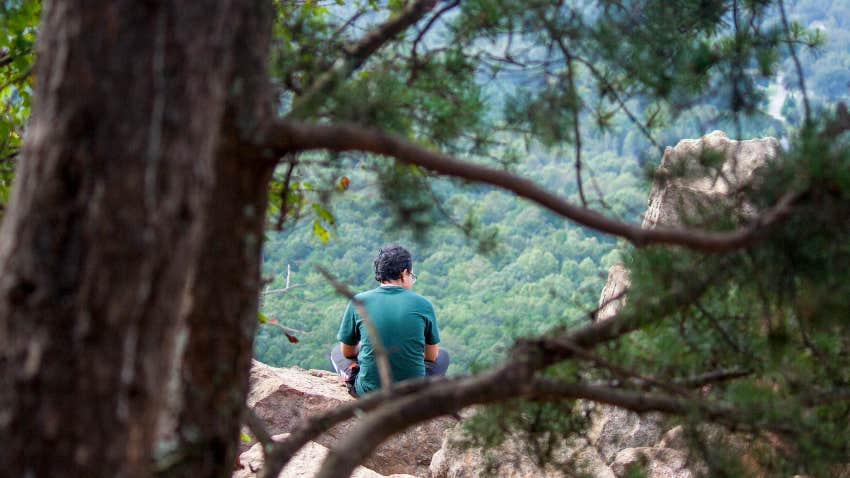3 Unique Japanese Concepts That Will Magically Transform Your Life
Prepare for your life to be changed.
 Toru-Sanogawa | Canva
Toru-Sanogawa | Canva In all honesty, I feel Japan is doing a better job of living than the rest of the world. Their mindfulness of life is off the charts. In my quest to live better and teach others to do the same, I feel magnetically drawn to Japanese philosophy.
Here are 3 unique Japanese concepts that will magically transform your life:
1. Kintsugi: The Art of Golden Repair
Kintsugi is the Japanese art of repairing broken pottery by mending the damaged areas with lacquer dusted or mixed with powdered gold, silver, or platinum. Speaking in philosophical terms, Kintsugi treats breakage as a part of the history of anything instead of something to disguise.
When we look at our own lives, each one of us has collected a wardrobe full of scars. And I use the word ‘wardrobe’ in the metaphor because we’re not exactly keen on sharing the stories of our scars. We don’t display them on the walls of our rooms. Instead, we keep them hidden in a locker in a wardrobe, and many of us have even thrown the keys to that locker in the Pacific Ocean.
Looking at my own life, I too, have collected quite a few scars. We’re all friends here, aren’t we? Allow me to be vulnerable.
- Constantly being rejected by girls in school
- Being bullied in school
- Not being invited to parties.
- Failing to get into my dream college. I got accepted into the least popular medical college in the state. And yes, I spent the first few months crying in the washrooms.
Suffice it to say; that if you’re a person who’s old enough to drive, you too have a wardrobe full of scars. But only when we look at our scars, heartbreaks, and soul-crushing events through the perspective of Kintsugi, can we get the best out of them.
Kintsugi is based on a simple, yet liberating idea. Mend broken stuff using a lustrous metal like gold. We too must try to heal ourselves in a way that we become even more beautiful. And if I may, let me try to break it down into two parts to help you better understand it.
- Acceptance: We hesitate to share our scars with people because we feel they may make us look weak. Instead, doing this weakens us. Only when we’re comfortable sharing our scars and our losses with people can we get liberated from the emotional baggage.
- Repair: Mind you, we’re not just supposed to heal our scars. We’re supposed to heal our scars with golden sutures. I feel the best way to do that is to find some good that came out of your heartbreak and use it to make the world a better place. For instance, since I was bullied in school, I understand what it’s like to be insecure. I know how heavy, and broken people feel at some point in their lives. And I’ve developed this enormous sense of compassion towards people that I think I wouldn’t have if I weren’t bullied in school. Looking back, I’m immensely grateful to the people who bullied me. They made me a better person. (On the very off chance that the bullies are reading this — thanks, guys.)
In short, open the wardrobe of your scars. Don’t disguise them anymore. Hang them on your wall, and do that with pride. Embrace your story. Be vulnerable. Please, be vulnerable.
The world is craving for you to be vulnerable. Find some good that came out of the soul-wrenching events of your life and use that to become a better person and make this world a better place. The world needs you to do that.
2. Ma: Negative Space
The Japanese concept of Ma refers to nothingness or silence. Their entire culture is filled with it in so many different ways. Their art has many empty spaces.
Conversations have frequent silences. Even when they bow down, a deliberate pause is made at the end of the bow before coming back up — as to make sure there is enough Ma in their bow for it to have meaning and look respectful.
In researching this concept, I found a beautiful poem that captures the meaning of Ma.
Thirty spokes meet in the hub,
though the space between them is the essence of the wheel.
Pots are formed from clay,
though the space inside them is the essence of the pot.
Walls with windows and doors form the house,
though the space within them is the essence of the house.
(In keeping with the concept, I decided to add spaces within the poem.)
Ma is a beautiful concept. On the contrary, much of the rest of the world is desperately trying to fill all the blankness of life. In a way, I feel we’re afraid of nothingness.
And it’s a fear that’s being propagated amongst us like fire. Hustle culture is growing. Silence in conversations is a rare sight. We’re always doing something.
We hardly ever sit in silence with ourselves anymore. Either we’re working, or Netflixing. One study found that a 2-minute period of silence after listening to music significantly reduced subjects’ heart rate and blood pressure.
However, incorporating the concept of Ma could improve our lives in so many ways. And discussing the many beautiful ways, you could include Ma in your life warrants an article of its own. So I would like to focus on one meaningful way to use this concept to elevate your life — incorporating 30 minutes of ‘Think time’ in your day.
I feel many of us are suffering from a severe deficiency of internal mental stimuli. I believe it’s almost lethal to our mindset. Think about it. We work all day. When we’re not working, we’re playing games on the phone or watching Friends for the umpteenth time. Or we’re spending time with our families.
We’re always focusing on something external. We never think anymore. Except for the times we’re in the shower or while trying to sleep. Which is why we got our best ideas at that time.
Having started writing a few months ago, I’ve been thinking more than usual. And it’s insane how much my mind has elevated because of that. I’ve discovered realms of my mind that I couldn’t even comprehend earlier.
The world craves people who take the time to sit and think. For instance: Bill Gates does Think Weeks. While we don’t have to devote entire weeks to do that, I feel we can make it a habit to do at least 30 minutes of thinking every day. If you choose to do so, try to incorporate these two essential traits for a good thinking session.
- Direction: Direction is essential. You don’t want to use that time to regret the past or get anxious about the future. You want to use it to make your life better. So, think in terms of this question. “How can I make my life better?” I come up with one way — small or big — to improve my life every day, and I write about it in my journal. It can be as little as starting to drink apple cider vinegar every morning or as big as starting to exercise. Doesn’t matter as long as you come up with one way to live a better life.
- Letting your mind run amok: I’d be careful not to restrict my mind too much. For instance, every day, I was coming up with ways to improve my fitness or writing. However, I don’t want to be just restricted to those. So I began coming up with various ways to live better like journalling, stargazing every week, etc. So, don’t limit yourself to only certain areas of living. Instead, let your mind run amok.
 Pixabay / Pexels
Pixabay / Pexels
3. Shinrin-Yoku: Forest Bathing
This concept refers to being spiritually connected to nature. It’s not just about hiking or jogging in a park. It’s to mindfully engage your senses to soak up nature like a sponge. One study from The Journal of Exposure Science & Environmental Epidemiology found that the average American spends 93% of his or her life indoors. 87% of that is indoors, and 6% is in automobiles.
I don’t know about you, but something feels off about that to me. We’re nature yet we’re so disconnected from nature. I fail to understand how we got here. I mean, I do understand, but I refuse to keep living like this. We need to move closer to nature. Forest bathing seems like a fun way to do that.
To perform Shinrin-Yoku, you would first need to find a spot. A forest would be ideal. If a forest is not at your disposal, a park will do too. The key to performing Shinrin-Yoku is to engage all five of your senses in nature.
 Sam Jotham Sutharson / Pexels
Sam Jotham Sutharson / Pexels
Our minds are grossly out of sync with nature due to our hectic, success-chasing lives. The key is to reassemble that sync. Listen to the chirping of the birds. Take in the sound of the leaves crushing under your feet as you stroll. Look at how colorful nature is. Adore the playfulness amongst colors.
Take in the intoxicating aroma of the forest. Stick your nose in a flower and take the smell of it. Touch the barks of trees. Walk barefoot on the damp grass.
In short, do whatever you feel like doing. And do it aimlessly. The goal is not to get anywhere or gain anything. The goal is to be there. Let your curiosity guide you. Let your senses tell you what to do next. Let nature engulf you.
Forest bathing will elevate your life spiritually, mentally, and physically. It’s an absolute delight to treat yourself to one of these. I did one this morning. I went for a run in the nearby park and spent twenty minutes or so after that performing Shinrin-Yoku. It was soul-calming.
I’ve decided to schedule one session every week, and I’m going to make them longer. I suggest you do too. And please, actively put it on your schedule. Pick a day and time, and do it every week. If you don’t schedule it, you’ll never get to it because, well, life will happen.
If you want to live better — which, of course, you do — Japanese philosophy is worth a shot. Use these three concepts to live better.
- Kintsugi: The art of golden repair. This philosophy says that instead of hiding your scars of life, you must embrace them. Heal your scars in a way that you become a better person. Use whatever you learn to make this world a better place.
- Ma: Negative space. Japanese culture is filled with meaningful blankness in various ways. The rest of the world, on the other hand, is obsessed with filling every space we find. Incorporate nothingness and blankness into your life to live slowly and peacefully. One way to do that is to incorporate ‘Think Time’ into your day.
- Shinrin-Yoku: Forest Bathing. We’re grossly out of sync with nature. Starting today, schedule a session of forest bathing every week. Get outdoors, engage all of your senses, and reassemble your broken sync to nature.
Akshad Singi, M.D. is a writer whose work has been published in Better Humans, Mind Cafe, Medium, and more.

